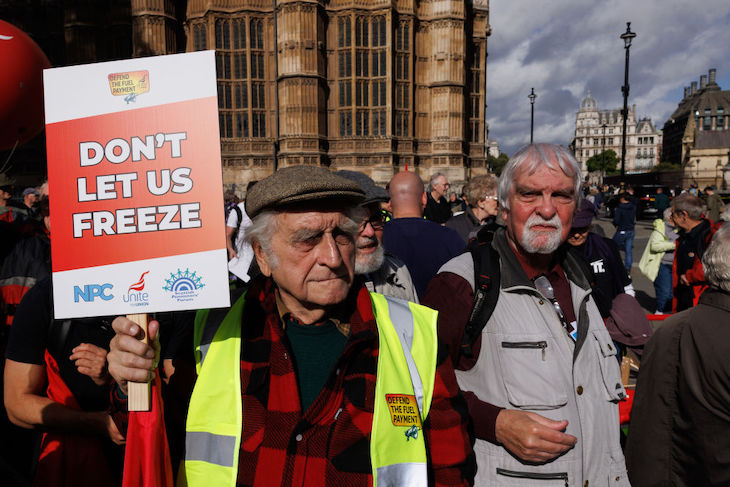Keir Starmer has ruled out a U-turn on the government’s decision to cut the winter fuel payment, with the Prime Minister’s spokesman insisting there ‘will not be a change to the government’s policy’. This came after a report in the Guardian suggesting No.10 was considering softening the £1.4 billion cut, possibly by raising the threshold that defines who qualifies as poor enough to receive it.
We can’t keep living in a state totally consumed by propping up its welfare system
That a U-turn was even floated reflects two pressures: disquiet among Labour’s backbenchers, and the electoral warning shot fired by Reform UK in last Thursday’s local elections and by-election. In Runcorn, where Reform won by just six votes, more than 18,000 residents previously received the winter fuel payment. Many within Labour blame the cuts for driving those voters away.
Analysis by The Spectator‘s data hub shows a path for Reform to build on this success. As the graph below illustrates, in constituencies with a high number of Winter Fuel recipients or Personal Independence Payment (PIP) claimants, the electoral margin between Reform and the incumbent narrows significantly compared to last summer’s results.
Labour’s temptation to revisit the policy is understandable. But reversing course would clash directly with the urgent need to rein in Britain’s ballooning welfare bill. To streamline eligibility, the government tied continued access to the winter fuel payment to those already on Pension Credit – a means-tested benefit. This triggered a surge in new Pension Credit claims and awards.
So far, 50,000 more people have been awarded Pension Credit than during the same period last year. The government's own impact assessment expects that number to reach 100,000. This uptick suggests that many who previously didn’t claim Pension Credit have been incentivised to do so purely to retain their winter fuel payment – suggesting that they didn’t need it in the first place. If the policy were reversed now, not only would the government lose the £1.4 billion savings – it would also face even higher ongoing costs as more people remain on Pension Credit.
Even without a policy reversal, this behavioural shift could wipe out a large part of the expected fiscal gains. According to Policy in Practice, for the savings from the winter fuel payment cut to hold, Pension Credit take-up would need to stay below 74 per cent of those eligible. Before the announcement, the take-up rate had already risen from 63 to 65 per cent, and will be higher now – meaning the cut’s effectiveness is already being undermined.
Besides, pensioners already receive a great deal more than working people. The winter fuel payment, introduced by Tony Blair in 1997, is essentially a £200 or £300 lump sum (depending on age) that can be spent on anything, not just energy bills. Meanwhile, the triple-locked state pension has risen by 4.1 per cent this year and 8.5 per cent last year.
Pensioners are already treated generously by the welfare system and more so than working-age adults or families. At a time when public finances are stretched, it’s hard to justify protecting yet another universal benefit for a group that is, on the whole, better off than it once was.
Treasury figures show that nearly 22 per cent of everything you are taxed is now being spent on welfare, with another 11 per cent going towards the state pension. Combined, that makes up a third of everyone’s tax bill and accounts for over three times the amount going on education, over six times the amount going on defence and nearly eight times as much as we’re spending on business and industry.
We can’t keep living in a state totally consumed by propping up its welfare system. The expansion in the size of the state required to do so would crowd out any room for growth. If Labour is serious about fiscal and economic responsibility, it must resist the urge to chase votes with costly reversals.








Comments